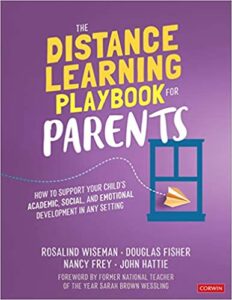The Distance Learning Playbook for Parents by co-author Rosalind Wiseman (Book Excerpt)
 HAPPINESS?
HAPPINESS?
What is it?
Before the pandemic, most parents, when asked what they want for their children, said, “I want my child to be happy.” But what does happiness really mean? It can’t mean free from painful experiences or conflict with others because those things constantly hap- pen. It can’t be free from failure because that happens as well, and it often presents important lessons. Not only can happiness include struggle and uncertainty but can also provide emotional resilience to be content even through hardship. Here’s some good news. What makes humans happy tends to come down to the same things no matter their race, age, political viewpoint, ethnicity, religion, or class. It’s one of those things that connects us to each other. So, let’s define it in a different way. Consider the following five conditions as essential ingredients of happiness.
- A sense of purpose and meaning beyond oneself
- Hope of success
- Meaningful social connection
- Fulfilling work (especially if you are working with others on a common goal)
- A place to process and find peace
By the way, one of the reasons why young people love playing video games so much during COVID-19 is because the games provide these conditions. They are working hard, usually with a group of people, to hopefully succeed (advance to the next level) toward a common goal like unlocking new powers. Then, after the game, you can talk to your friends about it. That’s happiness.
Why is it important?
When we focus on these conditions, it’s also easier to see why the process of developing social and emotional skills is so connected to happiness, even when it feels hard. This definition of happiness grounds us and reminds us of what we need to be OK, to have the capacity to meet the daunting situation we are facing, and how important the lessons we are maybe being forced to learn now will positively come with us in the future.
Take Action
- Ask your child to go through the conditions of happiness and identify something in their life that fulfills each condition.
- Go through the same process for yourself.
- If you feel comfortable, show each other your responses.
THE POWER OF DIGNITY
What is it?
Dignity is the belief that we all have inherent worth. When it is the foundation of our rela- tionships, it is transformative because we feel recognized, acknowledged, included and safe, and seek to affirm those feelings in others. Dignity is the inherent worth and value of every human; everyone has it and everyone has the same amount. Why does this matter? The second we decide that someone’s dignity is negotiable, we have opened up psychological distance between people, the idea that there is an us and them. When we feel psychological distance from others it changes how we see them, what we think we owe them, and how we think we get to treat them.
Schools are among the most socializing places in our society and ought to be a place where every child’s dignity is upheld. Schools, like society, can be places where diverse views are heard and experienced. Knowing how to deal with such diversity and being able to hold and understand counter views is a key for advancing a civil society. An aim that we imagine parents share with educators is empowering children to overcome any oppressive conditions that can strip human dignity and teach them to see dialogue as the starting point of valuing one’s and others’ viewpoints. Many teachers work very hard to model these values in schools, and when parents work alongside educators to impart these values, young people feel safer because they can see their villages address conflict productively and see the benefit of coming together to solve problems.
Why is it important?
Dignity cannot be earned or lost: it is a non-negotiable right. It may seem apparent and straightforward that everyone has essential value. However, the practice of using dignity to guide our interactions with each other is actually a radical shift—especially in parenting and educating young people. While we are all born with dignity, we are not born knowing how to act in ways that honor everyone’s dignity, including our own. These skills must be learned and practiced. Dignity also provides invaluable context for young people and answers their inevitable question, “Why is learning emotional intelligence and how to manage relation- ships important?”—because it gives us a common language and concrete tactics to create and maintain a school climate where all can engage and feel welcome.
10 ELEMENTS OF DIGNITY
by Donna Hicks
ACCEPTANCE OF IDENTITY
Approach people as neither inferior nor superior to you; give others the freedom to express their authentic selves without fear of being negative judged; interact without prejudice or bias, accept how race, religion, gender, class, sexual orientation, age, disability, etc. are at the core of their identities. Assume they have integrity.
RECOGNITION
Validate others for their talents, hard work, thoughtfulness, and help; be generous with praise; give credit to others for their contributions, ideas, and experience.
ACKNOWLEDGMENT
Give people your full attention by listening, hearing, validating, and responding to their concerns and what they have been through.
INCLUSION
Make others feel that they belong at all levels of relationship (family, community, organization, nation).
SAFETY
Put people at ease at two levels: physically, where they feel free of bodily harm; and psychologically, where they feel free of concern about being shamed or humiliated, and that they feel free to speak without fear of retribution.
FAIRNESS
Treat people justly, with equality, and in an evenhanded way, according to agreed-upon laws and rules.
INDEPENDENCE
Empower people to act on their own behalf so that they feel in control of their lives and experience a sense of hope and possibility.
UNDERSTANDING
Believe that what others think matters; give them the chance to explain their perspectives, express their points of view; actively listen in order to understand them.
BENEFIT OF THE DOUBT
Treat people as trustworthy; start with the premise that others have good motives and are acting with integrity.
ACCOUNTABILITY
Take responsibility for your actions; if you have violated the dignity of another, apologize; make a commitment to change hurtful behaviors.

The Distance Learning Playbook for Parents: How to Support Your Child’s Academic, Social, and Emotional Development in Any Setting by Rosalind Wiseman, Douglas Fisher, Nancy Frey, and John Hattie. Copyright © 2021 by Corwin Press, Inc. All rights reserved.
ROSALIND WISEMAN is a teacher, thought leader, and best-selling author of Queen Bees & Wannabees, the book that inspired the hit movie and musical Mean Girls; Masterminds & Wingmen; and Owning Up: Empowering Adolescents to Create Cultures of Dignity and Confront Social Cruelty and Injustice, Third Edition, a curriculum for middle and high school students. She is the founder of Cultures of Dignity and lives in Colorado with her husband and two children. Follow her on Twitter @cultureodignity.
Tags: dignity, distance learning, education, family, happiness, having children, kids, motherhod, pandemic, pandemic learning, parenting, remote learning, school, virtual classes















